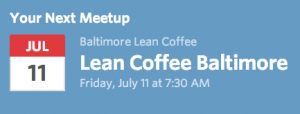All Agile teams should be holding a daily standup meeting. Don't think of it as a daily planning meeting. Think of it as a daily opportunity to have a shared understanding of what is getting done and what lies ahead. During a daily standup meeting, participants sometimes exhibit negative behavior that will detract from the meeting. As an empowered team, it is your job to self-manage and encourage good behavior. Some of these behaviors are so common, we don't even realize people are doing them. So, I'm giving them some names. Next time you hold a daily standup, see if anyone (including yourself) exhibits any of these 10 behaviors. Rather than using the list as a means to label others, use it to reflect on yourself. How might others be perceiving you? Is the persona you are projecting counter to your goals?
If you think of some behaviors that should be added to the list, I would love to see them.
Daily Standup Meeting Negative Personas
10. Pat Decker the Obsessive Phone Checker
This person does not always pay attention and is constantly look at her (or his) phone. Did a BFF just like something? Did someone on Twitter just favorite that pic of the team board? In addition to checking her phone, she likes to share what she sees with others during the standup. "Pssst, Bob, check out this Vine video or pic on Instagram". She's not so loud that she's overly disruptive but now Bob missed what someone else said during the standup.
9. Stephen Craig who is Always Too Vague
This person can get stuck on the same task for days but doesn't want anyone to know. When speaking to the team, they are crazy vague. Stephen will offer very few details until the team pushes for a deadline. He (or she) will use language like "Yesterday I was working on task 123 and today I will be working on it some more". No other information is volunteered. When asked if they need any help, they clarify they have no blockers or risks.
8. Bobbie Bainer the Team Complainer
When the attention is on Bobbie, get ready for the positive energy to be sucked right out of the room. Bobbie complains, complains, and complains some more. Management, teammates, or the technology is all fare game. Everything and everyone sucks and no one knows just how bad they have it. Don't bring up religion or politics unless you want Bobbie to go right into a 20 minute tirade.
7. Jess Jewler who loves the Water Cooler
Jess comes to the daily standup to talk, but not about what needs to be done today. Instead, he or she will talk about just about everything else. The next 15 minutes is dedicated to the water cooler. Did you see the last episode of House of Cards or The Walking Dead? Are you going to watch the Ravens play this weekend? My son plays Minecraft and constructed this totally awesome building with redstone. Anything is fair game, as long as it's not about work.
6. Billy Platitude with the Bad Attitude
Billy is a leftover from a bygone era. He was the best of the best mainframe developers and all he needs is a DLD and he'll give you what you need... in a few months. You want any changes between now and then? Forget it! He thinks all things agile are stupid and just plays along begrudgingly. You may catch him make cynical "funny" comments at standup to point out how right he is about how stupid agile is.
5. Will Funky the Non-Committal Junkie
Will does not want to be painted into a corner. Typically, he uses language like try, maybe, pretty sure, I'll get back to you, we'll see, would like to think, soon, almost. You'll also see Will be the last person to comment on something and will usually go with the crowd.
4. Tom Mater the Specialty Updater
Tom only gives vague commitments, usually understandable only by those in his discipline. The overall team gains little value from the statements. If you ask him for details, he'll either tell you to look it up in a tool or he'll be very technical in his response. Half of the team doesn't understand what the hell he's talking about.
3. Drue Gru who thinks he's Better Than You (and the team)
Drue has been around for a long time. He's better than you and he knows it. If you need him, you know where to find him. He either arrives to the standup meeting late or he doesn't come at all. He has little to say because you wouldn't understand what he's talking about. He already knows everything so what is he to gain by slumming with you and the team for 15 minutes? Let him know when something important happens. *sarcasm*
2. Pearl Revolver the Problem Solver
Pearl means well but she lacks a sense of time. She wants to have in-depth problem solving discussions on obstacles identified during the standup meeting. She's very curious what issues others are having because she's going to want to talk it out and fix it right then and there. Even if there is a reserved 15 minutes after the standup, Pearl figures there is no better time than the present to tackle a challenge.
1. Ian Krumpter the Interrupter
Do you listen or do you wait to talk? Stop and think about that. There is a difference. Ian waits to talk. People can be binary in that way. If you're talking, you're less likely to be listening. He wants to prove just how awesome he is so you'll see him interrupt even if the topic doesn't really apply to him.
Thank you to the other coaches at LeadingAgile for their contribution to this post. The original post was dated March 17 over at the LeadingAgile blog.
Image Credit: Pictofigo


 This summer, things come in three's.
This summer, things come in three's.




 On March 11, 2014, I presented a talk to
On March 11, 2014, I presented a talk to 
 I recently published a post over at the LeadingAgile website.
I recently published a post over at the LeadingAgile website.